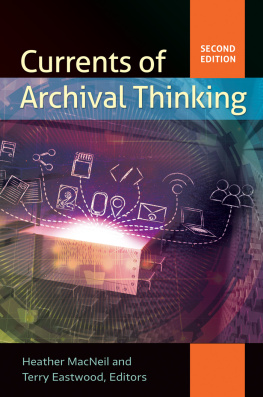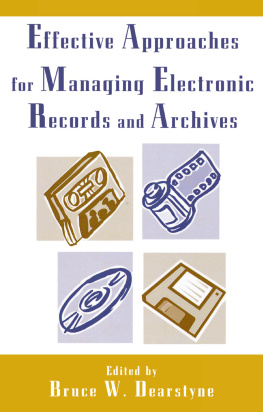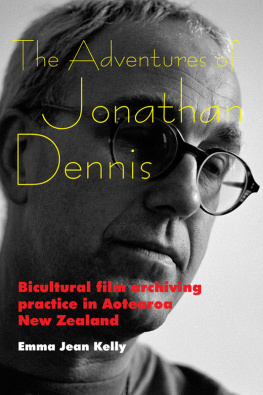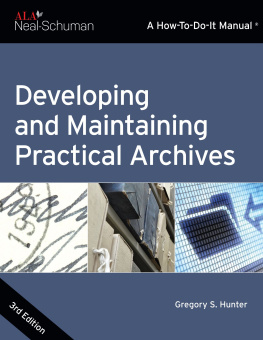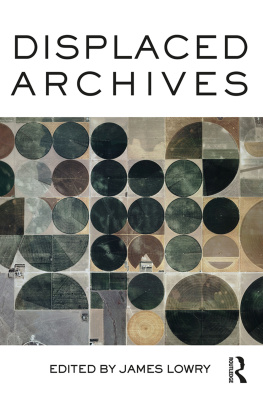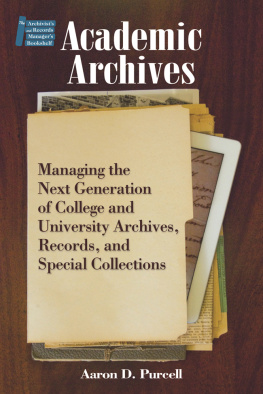CURRENTS OF
ARCHIVAL
THINKING

SECOND EDITION
Heather MacNeil and Terry
Eastwood, Editors

Dedicated to Sigrid McCausland
friend, valued colleague and inspiration
Copyright 2017 by Heather MacNeil and Terry Eastwood
All rights reserved. No part of this publication may be reproduced, stored in a retrieval system, or transmitted, in any form or by any means, electronic, mechanical, photocopying, recording, or otherwise, except for the inclusion of brief quotations in a review, without prior permission in writing from the publisher.
Library of Congress Cataloging-in-Publication Data
Names: MacNeil, Heather, editor. | Eastwood, Terry, 1943- editor.
Title: Currents of archival thinking / Heather MacNeil and Terry Eastwood, editors.
Description: Second edition. | Santa Barbara, California : Libraries Unlimited, 2016. | Includes bibliographical references and index.
Identifiers: LCCN 2016038364 (print) | LCCN 2016050735 (ebook) | ISBN 9781440839085 (paperback) | ISBN 9781440839092 (ebook)
Subjects: LCSH: Archives. | ArchivesPhilosophy. | Archivists.
Classification: LCC CD972 .C87 2016 (print) | LCC CD972 (ebook) | DDC 027dc23
LC record available at https://lccn.loc.gov/2016038364
ISBN: 9781440839085
EISBN: 9781440839092
21 20 19 18 171 2 3 4 5
This book is also available as an eBook.
Libraries Unlimited
An Imprint of ABC-CLIO, LLC
ABC-CLIO, LLC
130 Cremona Drive, P.O. Box 1911
Santa Barbara, California 93116-1911
www.abc-clio.com
This book is printed on acid-free paper 
Manufactured in the United States of America
Contents
Terry Eastwood and Heather MacNeil
Terry Eastwood
Jennifer Douglas
Adrian Cunningham
Gillian Oliver
Fiorella Foscarini
Glenn Dingwall
Geoffrey Yeo
Wendy Duff and Elizabeth Yakel
Sigrid McCausland
Elizabeth Shepherd
David A. Wallace
Alexandra Eveleigh
Jeannette A. Bastian
Rebecka Sheffield
Introduction: Shifting Currents
Terry Eastwood and Heather MacNeil
The second edition of Currents of Archival Thinking ( Currents 2) continues the exploration, begun in the first edition, of the shifting, converging, and crosscurrents of archival thinking about the nature and purpose of archives and the role of archivists and archival institutions in the creation, use, and preservation of societys documentary record. As was the case with the first edition, contributors to Currents 2 were invited to reflect and speculate on a wide range of topics, but the questions they addressed in their respective essays were very similar: How has this area of archival concern been understood historically? How is it understood today? Where are the points of continuity and contestation in discussions of this topic? How have technological changes affected the way we think about it? How have currents of thinking in other disciplines about this topic influenced our own understanding of it?
Some of the essays included in this second edition are updated versions of ones that appeared in the first edition; others are new contributions that explore topics not covered in the first edition. The essays have been organized under three broad headings. Foundations focuses on the roots and subsequent development of archival theory and the history of archival institutions. Functions reflects on what it means to manage current records; identify, preserve, and make available for use records of enduring value; and communicate to the general public the role of archives and archival institutions. Frameworks examines a few of the broad social and political movements that are reshaping the archival endeavor in the twenty-first century.
SHIFTING FOUNDATIONS
The archival body of knowledge that took shape in the nineteenth and early part of the twentieth centuries was rooted in jurisprudence, positivist history, and a centuries-old body of written reflection and experience about the nature of records and recordkeeping practices of administrative entities from previous centuries. As Terry Eastwood explains in his essay, the traditional organic concept of archives as the natural, interrelated, and unique outcome of a record creators activities and their consequent value as authentic and impartial sources for history grew from these roots.
In contemporary archival discourse, this traditional view has been contested on the grounds that it is incompatible with current understandings about the nature of records and recordkeeping environments and fails to account for the manifold ways in which human, social, and ideological forces impinge on the use, production, and transmission of archives through time and space. Out of that contestation, Eastwood suggests, a broader and more nuanced view of the nature of archives has come forth, one that takes into account their mutability, the fluidity of contemporary recordkeeping environments, and the social contexts that determine the archives formation both before and after they are transferred to archival custody. Such view, he maintains, does not displace the traditional one so much as it reinterprets it in light of the changing environment.
A related shift in thinking is discernible in the way archivists interpret the principle of provenance. When it was first articulated in the nineteenth century, the principle was understood primarily as an organizing device for the physical arrangement of closed fonds. In the contemporary archival literature, it is more commonly understood as an umbrella term for the multiplicity of contexts in which a body of records is created, used, transmitted, and preserved. The relationships between and among records, their creators, and custodians as well as the sociohistorical circumstances that have shaped the records over time are all considered under this umbrella.
In her essay, Jennifer Douglas traces the evolution of provenance from organizing principle to physical and conceptual construct and to sociohistorical context, considering, along the way, the influence of new technologies, fluid recordkeeping environments, the writings of postmodernist theorists, and the call for social justice on that evolution. Douglas views the expansion of the boundaries of provenance that has occurred in the wake of its most recent repositioning as sociohistorical construct as a positive development inasmuch as it acknowledges the complexity of archival origins. She wonders, however, whether collapsing all the various contexts of records creation into the amorphous conceptual category of provenance may have the inadvertent result of leveling some of that complexity and proposes means by which to mitigate that possibility.
Adrian Cunninghams essay shifts our attention from the origins and evolution of archival theory and method to the diverse histories of archives as physical and conceptual spaces. Over the centuries, archival repositories have been positioned variously as arsenals of administration, bastions of citizen and state rights, laboratories of history, physical and virtual sites of collective memory, and metaphoric sites of knowledge and power. Cunningham traces the myriad ways in which the archiving impulse and imperative has manifested itself in different times and places and considers how archival understandings of archives as place are changing yet again in response to contemporary shifts in the technological, social, political, and philosophical landscape in which archives are situated. His historical and comparative analysis demonstrates that the concept of archives as place is a mutable, dynamic, and contingent one.

